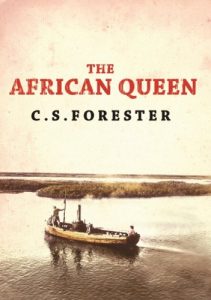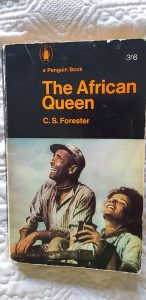 My father, not a lover of written fiction, preferred films. And one of his favourites was John Huston’s 1951 The African Queen based on CS Forester’s 1935 novel. That meant that I saw it several times when I was growing up before eventually coming to the novel and discovering what a little masterpiece it is. I doubt that my father ever read it any more than I’ve seen the film since about 1965. But the novel is a firm favourite of mine and it was a treat to take down my well thumbed copy for a revisit.
My father, not a lover of written fiction, preferred films. And one of his favourites was John Huston’s 1951 The African Queen based on CS Forester’s 1935 novel. That meant that I saw it several times when I was growing up before eventually coming to the novel and discovering what a little masterpiece it is. I doubt that my father ever read it any more than I’ve seen the film since about 1965. But the novel is a firm favourite of mine and it was a treat to take down my well thumbed copy for a revisit.
What strikes me now, over 50 years since I first enjoyed it, is what a classic it is in every sense. If you subscribe to the view, as I do, that all fiction is rooted in a handful of basic, timeless stories then The African Queen is at least three of them. In case you don’t know the story it gives us a frumpy missionary’s sister and a cockney mechanic forced by circumstances to escape down a treacherous central African river to outwit the ruling Germans in 1914. Thus it is a quest story as they head for the lake with a crazy plan to strike a blow for Britain. It is also a seeing off the monster (Germany) narrative and against the odds it is also a very unlikely, passionate, tender love story. No wonder it works so well.
I relish the way Forester, whose writing is economical and sometimes even spare, describes the river with its rapids, shoals, cataracts, bends, rushes, weeds, leeches. The water swirls and changes colour as they haul themselves through the overgrown channels in the delta after the dangers of shooting at high speed through stretches which were regarded by explorers and mapmakers as unnavigable. It’s always sensual, often colourful and never overwritten.
He’s brilliant on the feelings of both characters too – Rose’s dogged determination and Alnutt’s skilful ingenuity create a strong team and the development of the relationship between them is beautifully judged. So are the descriptions of Alnutt keeping the boat going by collecting driftwood to burn in the boiler, repairing propeller and shaft and, eventually improvising a couple of torpedoes.
Of course EM Forster would have had a few things to say about it As he points out in Aspects of the Novel, Homo Fictus doesn’t quite function like Homo Sapiens. Although Alnutt and Rose bathe off the boat privately from each other at first we are left to assume that their bladders and bowels stop working when they leave the Mission. And doesn’t Rose have periods? After weeks of “marriage” to Alnutt she’d probably be pregnant anyway but it’s a minor gripe – and really just a reflection of how many novels were written 86 years ago although I’m not sure I noticed it when I first read it.
It’s quite an accolade for a book, I think, if you can read and like it at 18, come back to it decades later in maturity and still admire it. Rereads can be disappointing – but not this one. I see the film is available on Netflix and I’m wondering whether to revisit that too.
Next week on Susan’s Bookshelves: A Twist of the Knife by Peter James